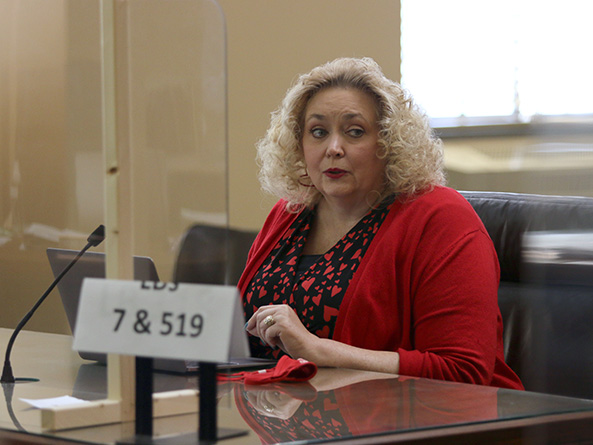Limited immunity sought for violent crime victims, witnesses
The Judiciary Committee heard testimony Feb. 5 on a bill meant to encourage people to report violent crimes.

Under LB7, sponsored by Bellevue Sen. Carol Blood, a person who is a victim of or witness to a violent crime would be eligible for legal protection against charges of nonviolent drug possession or solicitation.
It already is common practice in many Nebraska jurisdictions, Blood said, to withhold arrest for lower-level offenses when gaining cooperation in the reporting or investigation of more serious crimes.
“This bill builds upon our history of good Samaritan laws for victims to ensure someone is able to engage with law enforcement or seek critical medical care safely and without fear of criminal repercussions,” she said. “By allowing survivors and witnesses of violent crimes to report without fear of criminal prosecution or arrest for nonviolent offenses, LB7 supports identification of violent crimes in our community.”
Under LB7, a person who reports a violent crime in good faith to law enforcement or requests emergency medical assistance for a victim of such crime would be eligible for immunity from prosecution if evidence supporting arrest or prosecution of the crime is collected as a result.
Speaking in support of the bill was Kelsey Waldron of the Women’s Fund of Omaha. Victims of sex trafficking often form a “trauma bond” with their perpetrator due to extensive manipulation, she said, which may prevent them from coming forward.
“This bill will support our state in creating more trauma-informed processes, specifically as it relates to instances of sex trafficking,” Waldron said. “[It] recognizes the complex nature of trauma that may cause someone to not identify as a victim and addresses these legal gaps by supporting individuals in accessing emergency care or engaging in our criminal legal system.”
Also supporting LB7 was Tracy Scherer, representing the Omaha Police Department. Victims of sex trafficking historically have been disbelieved, she said, and often have difficulty trusting those whose intentions are to help.
“We believe having [immunity] in statute will go further toward victims being willing to [come forward] because of the complex trauma of trafficking victims as well as the distrust of supportive systems and outside agencies,” Scherer said.
Corey O’Brien, speaking on behalf of the Nebraska Attorney General’s Office, opposed the bill. Preserving limited discretion to confer immunity, he said, would allow prosecutors to continue to present thoroughly vetted cases to juries.
“By giving them blanket immunity statutorily, without the vetting process or being able to lay out the terms before a jury, it substantially impacts our ability to prosecute the human traffickers and defend the reliability and credibility of victims and our cases,” O’Brien said.
The committee took no immediate action on the bill.


